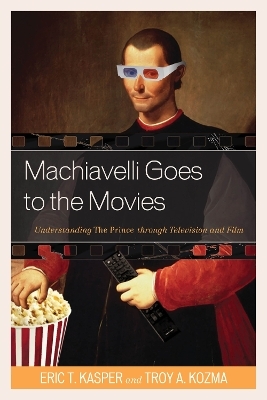
Machiavelli Goes to the Movies
Lexington Books (Verlag)
978-0-7391-9594-9 (ISBN)
Niccolò Machiavelli’s The Prince remains an influential book more than five centuries after he wrote his timeless classic. However, the political philosophy expressed by Machiavelli in his tome is often misunderstood. Although he thought humans to be rational, self-interested creatures, and even though he proposed an approach to politics in which the ends justify the means, Machiavelli was not, as some have argued, simply “a teacher of evil.” The Prince’s many ancient and medieval examples, while relevant to sixteenth century readers, are lost on most of today’s students of Machiavelli. Examples from modern films and television programs, which are more familiar and understandable to contemporary readers, provide a better way to accurately teach Machiavelli’s lessons. Indeed, modern media, such as Breaking Bad, The Godfather, The Walking Dead, Charlie Wilson’s War, House of Cards, Argo, and The Departed, are replete with illustrations that teach Machiavelli’s critical principles, including the need to caress or annihilate, learning “how not to be good,” why it is better to be feared than loved, and how to act as both the lion and the fox. Modern media are used in this book to exemplify the tactics Machiavelli advocated and to comprehensively demonstrate that Machiavelli intended for government actors and those exercising power in other contexts to fight for a greater good and strive to achieve glory.
Eric T. Kasper is assistant professor of political science at the University of Wisconsin-Eau Claire. Troy A. Kozma is associate professor of philosophy for the University of Wisconsin Colleges.
Introduction: “The Ends Justify the Means” or “One Must Consider the Final Result”?
1.Studying and Using History: Charlie Wilson’s War
2.Caress or Annihilate When Taking Power: The Godfather and Breaking Bad
3.Nip Political Problems in the Bud: Charlie Wilson’s War, Primary Colors, and A Bronx Tale
4.People Accustomed to Freedom Will Seek It Again: Braveheart and Red Dawn
5.The Difficulty of Introducing Something New and the Importance of Being Armed: The Untouchables and Charlie Wilson’s War
6.Bribery and Dirty Work: Lincoln, Richard III, and Wag the Dog
7.The Problems of Being in Charge without Prior Experience: Dave and Orphan Black
8.The Use of Cruelty: Hoffa, Wag the Dog, and The Untouchables
9.Reliance on the People: All the King’s Men and O Brother, Where Art Thou?
10.Rally ‘Round the Flag: Wag the Dog, Braveheart, and The Patriot
11.Power Can Be Exercised in Any Institution: The Da Vinci Code and The Manchurian Candidate
12.Keep Your Own Army and Prepare It for War: Braveheart, Heat, Alexander, and Independence Day
13.Vices versus Virtues and Learning Not to Be Good: Scarface, The Godfather, The Departed, and Richard III
14.Miserliness is Better than Liberality: Ghostbusters and The Patriot
15.It is Better to Be Feared than Loved: Band of Brothers, A Few Good Men, and A Bronx Tale
16.Deception: The Godfather, Primary Colors, The Walking Dead, and Bob Roberts
17.The Lion and the Fox: The Godfather, Breaking Bad, Charlie Wilson’s War, The Usual Suspects, and Argo
18.Pick a Side and Stick to Your Decisions in Politics: The Contender, Harry Potter, and House of Cards
19.The Need for Both Military and Popular Support: Lincoln, O Brother, Where Art Thou?, and Red Dawn
20.Honor Those with Talent and Hold Festivals: Gladiator, The Hunger Games, and House of Cards
21.Have Only a Few Trusted Advisors and Give them Wealth so they Remain Loyal: House of Cards, Breaking Bad, The Departed, and Lord of the Rings
22.Virtue versus Fortune: Election and Mad Men
Conclusions: Seeking Greater Glory
| Erscheint lt. Verlag | 24.3.2015 |
|---|---|
| Verlagsort | Lanham, MD |
| Sprache | englisch |
| Maße | 162 x 235 mm |
| Gewicht | 449 g |
| Themenwelt | Geschichte ► Allgemeine Geschichte ► Neuzeit (bis 1918) |
| Geisteswissenschaften ► Philosophie | |
| Geisteswissenschaften ► Sprach- / Literaturwissenschaft ► Anglistik / Amerikanistik | |
| Geisteswissenschaften ► Sprach- / Literaturwissenschaft ► Literaturwissenschaft | |
| Sozialwissenschaften ► Politik / Verwaltung ► Politische Theorie | |
| Sozialwissenschaften ► Politik / Verwaltung ► Vergleichende Politikwissenschaften | |
| ISBN-10 | 0-7391-9594-8 / 0739195948 |
| ISBN-13 | 978-0-7391-9594-9 / 9780739195949 |
| Zustand | Neuware |
| Haben Sie eine Frage zum Produkt? |
aus dem Bereich


